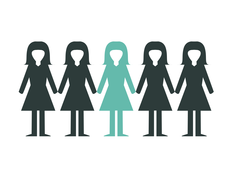
At some point, just about everyone who begins the serious study of Torah asks themselves this question: How did the rabbis get away with making up so many laws that have so little basis in the text of the Torah? To name just one example, the Torah says absolutely nothing about the fate of a woman whose husband divorces her, but the rabbis developed a complex marriage contract—the ketubah—to protect women from cruel poverty after divorce. Where did the rabbis get the right to alter the Torah to this extent?
The answer, of course, is that they got the right to change the Torah from the Torah itself.
The ancient rabbis knew that they went far afield in their interpretations. They admit it in the Mishnah, where they talk about the many laws they pronounced based on just a few scant verses. The sages say, "The laws concerning Shabbat, the festival offerings, and the transfer of sacred items for secular use are all mountains suspended by a hair! Scripture teaches little about them but the laws we derive are many!" (M. Chagigah 1:8).
In fact, rabbinic Judaism is based on exactly this kind of far-reaching interpretation. In the time of the rabbis, the survival of the Torah depended upon it.
The Torah is the product of an agricultural civilization built around a powerful king and a Temple where priests oversaw sacrifices to earn God's protection for the nation. That civilization quickly was becoming irrelevant by the first century c.e. when the rabbis took center stage. The rabbis recognized that in order to maintain the core values of the Torah, they had to show that the Torah was really a guide that taught spiritual lessons hidden in the rules about herding cattle and offering sacrifices.
The rabbis had to adapt the Torah to the needs of an age that was predominantly urban, that had lost the sovereignty of its king, that was influenced by the universal ideals of Greek philosophy, and that was increasingly skeptical of the inherited authority of priests. The rabbis used interpretation to transform the Torah into a teaching fit for philosophers and ethicists, instead of for farmers, priests and kings.
But, how did they unlock the Torah to make such transforming interpretations? The key was there in the lock itself, only waiting for someone's hand to turn it.
In the story of the daughters of Zelophechad, the five sisters came before Moses to present a grievance. The law had stated that land could be inherited only by males. Since their recently deceased father had no male heirs, his inheritance would be scattered to the other men of the tribe. Their father's name would be lost to history and his land would permanently enter into the possession of other families.
Machlah, Noah, Choglah, Milkah and Tirzah went to Moses and said, "Why should our father’s name be lost to his family just because he had no son! Give us land to possess along with the rest of our father’s kin!" (Numbers 27:4). Moses heard their protest and could say nothing until he "brought the case before Adonai" (verse 5).
God instructed Moses that the daughters of Zelophechad were correct. When a man dies without leaving a male heir, God said, the daughters would be given possession of the land as the equals of their father's kinsmen. The previously pronounced law was challenged and changed through a new act of interpretation in order to meet an unforeseen need.
That is the power of the Torah—and the power of interpreting the Torah, which is first exemplified by the Torah itself! The Torah contains within itself the flexibility to change and to be rediscovered and reinterpreted.
In our own times, when so much has changed in the way we view the dignity of human beings—regardless of gender, race and sexual orientation—we can view this story as a reminder that keeping the Torah does not mean refusing to change. The Torah itself asks that we look at moral implications to adapt the law to meet the needs of the times. Not only does that keep Torah relevant, it draws Torah out of stagnation and into the realm of the joy of the human spirit.
That is the way of ensuring that the Torah's central teachings survive and thrive in a changing world.

 RSS Feed
RSS Feed
